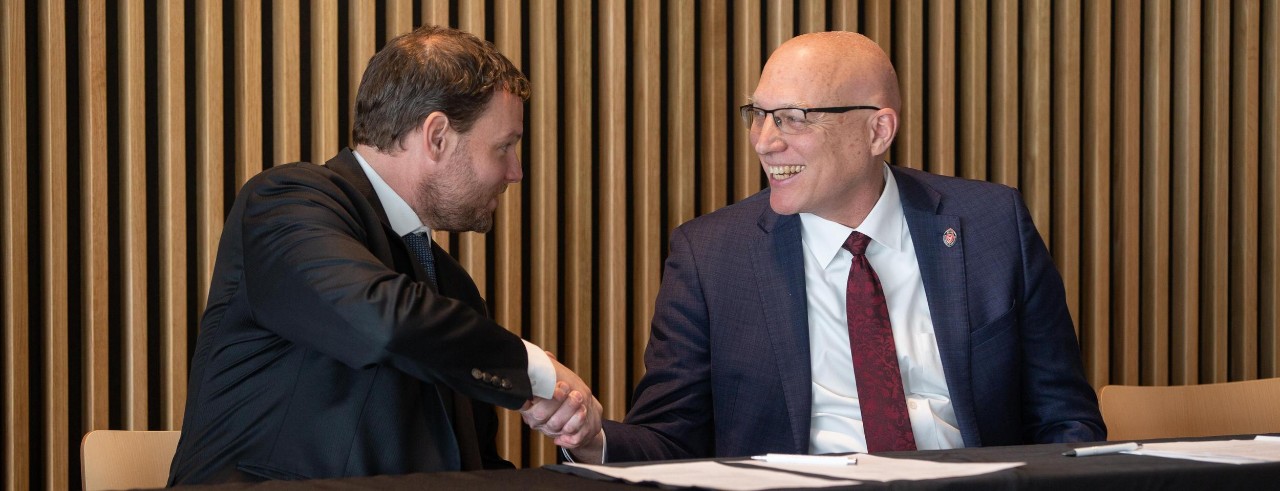
UC partners with Thales on aerospace research
Five-year agreement encompasses artificial intelligence, air mobility
The University of Cincinnati signed a research agreement to work with one of the world’s leading aerospace companies on national defense, space exploration and aeronautics.
Thales signed a memorandum of understanding with UC’s Office of Research for a five-year collaboration at UC’s new Digital Futures building. As part of the joint effort, Thales will share its state-of-the-art transparent artificial intelligence system with UC students and faculty that was developed by Thales engineers and alumni from UC’s College of Engineering and Applied Science.
“This partnership is a very UC story,” UC aerospace engineering Professor Kelly Cohen said. “This innovation started at UC and now has gone worldwide.”

UC aerospace engineering professor Kelly Cohen and his students will work with Thales on new research projects. Photo/Andrew Higley/UC Marketing + Brand
Thales will share its artificial intelligence, which uses fuzzy logic to make critical decisions. Instead of seeing the world in a binary right or wrong, fuzzy logic uses degrees of truth to make better decisions. They call the system “genetic fuzzy logic” because it “learns” from past mistakes to improve performance.
UC engineering alumnus Nicholas Ernest, now an engineer at Thales, created sophisticated artificial intelligence that is capable of outmaneuvering fighter pilots in simulations. Ernest and his UC research partners also applied genetic fuzzy logic to help doctors identify bipolar disorder from brain scans.
Scott Petersen, UC's director of cyber security research and military relations, said the partnership holds potential for applications well beyond drones and autonomous vehicles. Artificial intelligence can be something of a black box, but Petersen said Thales is developing systems that are explainable, ethical and transparent. These accountable systems are most in demand by industries ranging from transportation to medicine, he said.
“Thales is exactly the kind of industry partner that UC has been seeking and will work closely with our multidisciplinary teams to solve problems that matter,” Petersen said.
UC has a long and innovative history in the aerospace industry.
John Weidner, Dean of UC's College of Engineering and Applied Science
The announcement is just the latest investment in Ohio’s growing high-tech sector. Last year, Intel Corp. broke ground on the first of two new microchip fabrication plants in Ohio. Intel awarded UC $1.1 million to help prepare graduates for new jobs in this workspace. Meanwhile, Honda Motor Co. announced it will be building a $3.5 billion battery manufacturing plant in southwest Ohio to meet demand for electric vehicles.
And when it comes to aerospace, Ohio is a national leader. The state ranks fourth in PricewaterhouseCoopers’ 2022 aerospace manufacturing attractiveness rankings. Famously, Ohio native Neil Armstrong taught aerospace engineering at UC after setting foot on the moon.
“UC has a long and innovative history in the aerospace industry,” said John Weidner, dean of UC’s College of Engineering and Applied Science. “One of the next big opportunities is around artificial intelligence, in aerospace and beyond. We are fortunate to have faculty leaders in this research field, and we are excited to partner with Thales as we advance the implementation of AI.”

A UC student flies a drone in the new high-bay lab at UC's Digital Futures building. Photo/Andrew Higley/UC Marketing + Brand
UC is preparing the next generation of Ohio’s high-tech workforce to meet the growing demand for skilled workers through efforts such as the Cincinnati Innovation District. The district’s mission is to become a globally recognized talent hub for research and entrepreneurship through efforts such as UC’s Venture Lab, the 1819 Innovation Hub and the new Digital Futures research building.
Bharath Prabhakaran, UC's vice president and chief digital officer, said he sees a lot of opportunity to work with Thales on a variety of cybersecurity and technology projects.
“This is a huge step for UC,” Prabhakaran said. “There is a lot of opportunity for us in digital technologies. We're excited to leverage some of the great work Thales has done.”
Featured image at top: Thales and University of Cincinnati officials sign a five-year memorandum of understanding to partner on aerospace research. Photo/Andrew Higley/UC Marketing + Brand

UC signed a five-year agreement with Thales for research in digital technology and aerospace. Pictured from left are UC Vice President Bharath Prabhakaran, Thales Vice President of Business Development and Sales Yanik Doyon, UC College of Engineering and Applied Science Dean John Weidner and UC Director of Cyber Security and Military Relations Scott Petersen. Photo/Andrew Higley/UC Marketing + Brand
Birthplace of Co-op
UC invented cooperative education more than 100 years ago and continues to create new opportunities for students through internships, service learning, virtual co-ops, community projects and industry partnerships. Learn more.
Related Stories
UC partners with Thales on aerospace research
March 21, 2023
The University of Cincinnati signed a research agreement to work with one of the world’s leading aerospace companies on national defense, space exploration and aeronautics.
UC’s AI innovations at work
August 7, 2023
Here at the University of Cincinnati, researchers are employing AI to gather and analyze data, to better understand human behavior and to create simulations for improved predictions. They also are seeking to improve AI decision-making, and they’re creating programs to help students and faculty harness AI for good.
UC team wins first place in international ‘hackathon’
November 7, 2022
Combining their knowledge of economics and computer science, a University of Cincinnati professor and student won first place in an international hackathon competition with their solution to counter inflation's harmful effects.
